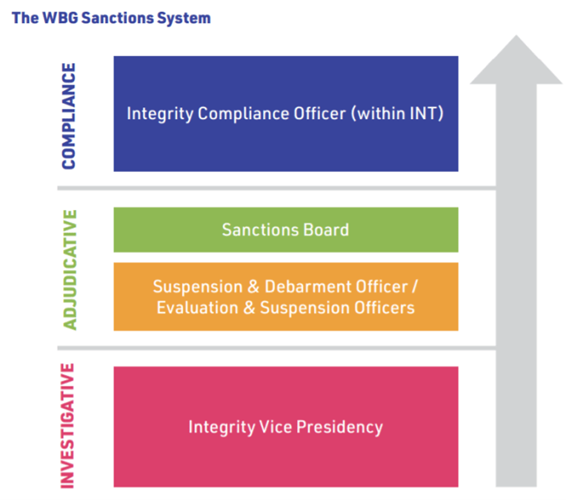
The World Bank published its Annual Sanctions Report for 2020, highlighting the institution’s concern with the projects it finances globally and potential risks of fraud and corruption.
The report was prepared by the World Bank Sanctions System team, which is comprised of the Vice President of Integrity (INT), the Office of Suspension and Exclusion (OSD), and the Sanctions Council. The report covers sanctions applied to companies and individuals involved in contracts for projects financed by the World Bank in countries all over the planet. By the way, the INT is also responsible for investigating fraud and corruption reports within the World Bank itself.
To this end, the World Bank established the following procedure:
The numbers are indeed impressive, considering that we are talking about only one institution. According to the data aggregation listed below:
- INT received 2,958 complaints and opened 429 new preliminary external investigations.
- INT initiated 46 new external investigations and issued 29 Final Investigation Reports (FIRs) to the President of the World Bank that involved 40 IBRD / IDA projects totaling $ 8.3 billion and 70 contracts totaling $ 974 million.
- INT submitted 26 cases and 22 agreements to the OSD.
- The OSD analyzed 29 cases and 22 agreements, temporarily suspended 30 companies and eight individuals, and sanctioned 19 respondents through uncontested determinations.
- The Sanctions Council issued six final public decisions, convened 14 times, and held oral hearings in more than 30% of cases.
- The Integrity Compliance Office (ICO) notified 43 new sanctioned parties about their conditions for releasing the sanction, engaged 107 sanctioned parties to fulfill the conditions for release, and determined that 18 sanctioned parties met the requirements for release.
- ICO continues to see the growth of successful relationships, begining with the ICO Mentoring Program.
- INT investigated 66 cases of alleged fraud and corruption involving World Bank employees and 16 cases involving corporate suppliers. INT assessed 114 complaints related to World Bank staff and corporate suppliers.
- INT substantiated allegations of misconduct in six cases by the World Bank staff and closed eight corporate suppliers cases, one of which was proven, two of which were unsubstantiated, and four of which were referred to Corporate Acquisitions for further analysis.
- One company was declared ineligible for contracts as a corporate supplier to the World Bank for a period of four years.
- INT worked in partnership with operational teams and client countries to transform the unique knowledge gained from INT’s risk analyses and investigations into practical measures to stop or prevent corruption.
- INT identified a total of 118 projects proposed as having integrity risks (known as Volcker Triggers) and 32 projects as having integrity problems.
- INT included recommendations for mitigating integrity risks in 7 FIRs.
The World Bank’s goals are to eradicate extreme poverty and promote shared prosperity in the countries it supports, and corruption represents a serious challenge to these objectives. Accordingly, the World Bank recognizes that corruption undermines its development goals, interferes with its fiduciary responsibility, and damages its reputation and that of its clients.
In this context, the World Bank penalizes the following practices:
According to the figure below, the sanction process at the World Bank is characterized by 3 phases: 1. Investigation, 2. Adjudication and 3. Creation of a Culture of Compliance:
From the 267 sanctions applied in 2020 to companies and individuals worldwide, we have created the ranking below, which illustrates the countries with the highest number of assessments:
As you can see above, China had the highest value of sanctions applied, followed closely by Nigeria. It is important to note that several first-world countries have a considerable number of sanctions on this list. For example, it is surprising to find Denmark on the list since the country is often considered one of the world’s least corrupt countries, according to the CPI ranking of Transparency International.
Brazil ranked 13th, with five sanctions applied, four to companies in the construction industry and one levied on an individual also linked to the construction industry. Currently, all of them are ineligible to participate in any project financed by the World Bank, and their respective periods of ineligibility range from September 14, 2022, to March 5, 2024.

